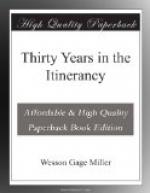filled one in the morning, another in the afternoon,
and then came to the Spring Street Church in the evening.
The house was filled as usual. He opened the
services in the regular order, took his text and began
the delivery of his sermon. Immediately a crowd
of strange men began to press in at the door and push
along up the center aisle. At a given signal,
a rush was made towards the Pulpit. Comprehending
the situation in an instant, the Pastor, from his position
in the Pulpit, ordered them back, and at the same time
directed the men nearest the aisle and altar to intercept
their advance. A stone was hurled at the Pastor’s
head, but it missed its mark and crashed against the
wall in the rear of the Pulpit. But L.S.
Kellogg, L.L. Lee and others stood firmly in
the aisle and dealt some vigorous blows in response
to the clubs and other missiles with which they were
being severely bruised. At this moment Dr. Waldo
W. Lake, who was sitting in the altar, drew a revolver
which he on leaving home had put in his pocket, expecting
after service to visit a patient in an exposed part
of the city, and instantly the rioters fell back and
retreated through the entrance to the street.
During the conflict the audience room was a wild scene
of confusion. The ladies became greatly alarmed,
and required the attention of a large number of gentlemen
in making their escape from the building. The
door being thronged with the rioters, the principal
egress was found to be the windows next to the street,
and these were elevated a full story above the pavement.
Ladders, wagons, and other impromptu scaffolding were
provided, and large numbers of ladies were rescued
in this way, while others were crowded against the
sides of the room until the rioters had withdrawn.
After quiet had been restored measures were taken
to convey the speaker safely to his lodgings at the
hotel. But a good number of revolvers, carried
by a posse of earnest men, were a sufficient protection
against all evil-minded persons that thronged the
streets on the way.”
The city was rocked with excitement. Early next
morning a meeting was held in the Church edifice that
had thus been made the scene of a riotous assault.
The populace interpreted the affair rightly. It
was not so much an attack upon a Protestant Church
as an assault against the freedom of speech, one of
the most sacred rights of the people. After expressing
suitable indignation against the actors and abettors
of the riot, and resolving to protect the freedom
of speech so long as it should not offend against
public morals, the meeting appointed a committee to
wait on Mr. Leahy, and, on behalf of the community,
guarantee him protection in his rights. Under
this protection a lecture was given in the Free Congregational
Church, and another on the public square, when, all
danger of assault having disappeared, he was permitted
to go on his way.




